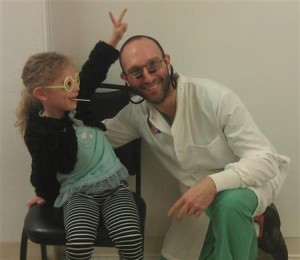Sedation Dentistry
Imagine your child undergoing a complex dental treatment like a root canal, extraction, or oral surgery. When treatment is complete, your child will have no recollection of the time it took, the pain, the noise, or the discomfort. We are pleased to offer your child the option of comfortable, safe, and effective sedation dentistry.
Meet Dr. Jacob Eisdorfer
 Jacob Eisdorfer DDS grew up in south Florida, received his undergraduate education at the University of Florida, and moved to Washington Heights to become a dentist and serve the wonderful people of New York City.
Jacob Eisdorfer DDS grew up in south Florida, received his undergraduate education at the University of Florida, and moved to Washington Heights to become a dentist and serve the wonderful people of New York City.
After receiving his dental degree from Columbia University, Dr. Eisdorfer trained in all aspects of dentistry in his general practice residency at New York Hospital Queens (New York Presbyterian). Not only did he serve children, nursing home, and special needs populations, but he also received his first exposure to anesthesia training during this time. Afterwards in private practice, he worked with adults who suffered from dental infection because they were afraid of the dentist and children who had severe dental disease but lacked the emotional maturity to sit still for traditional treatment. These experiences motivated him to become a dental anesthesiologist and obtain extensive training in sedation and general anesthesia at Lutheran Medical Center (NYU) in Sunset Park, Brooklyn.
Dr. Eisdorfer’s training involves over a thousand cases in the hospital surgical environment alongside physician anesthesiologists as well as mobile, office-based anesthesia provision focused on dental therapy. His experience includes patients from all walks of life and he provides individually tailored anesthesia for most people in the comfort of their own dental office.
Our pediatric dental patients who benefit from sedation dentistry have:
- A fear or anxiety of being at the dentist
- A hard time sitting still for long periods of time
- A hard time getting (and staying) numb from anesthetics
What is sedation dentistry?
Sedation dentistry allows your pediatric dentist to provide a variety of dental treatments safely and comfortably for children who experience anxiety when visiting the dentist. There are several benefits to sedation dentistry, including:
- No memory of undergoing the procedure
- No sense of time while under sedation
- No sense of smell or sound
- No fear or anxiety during treatment
Levels of Sedation
Sedation dentistry is closely regulated by law, and there are three sedative states at which your child's dentist can administer treatment: mild sedation, moderate sedation, and deep sedation.
- Mild Sedation — Anxiolysis is the lightest form of sedation dentistry and is often used for children with mild anxiety, longer procedures, or more complex situations. Mild sedation is usually administered orally. Your child will remain awake or very sleepy throughout the entire procedure and will be able to breathe normally, but he or she will feel a great sense of relaxation. Patients typically recover from anxiolysis sedation within a few hours after the procedure is complete. Nitrous oxide inhalation (laughing gas) is another form of mild to moderate sedation that results in relaxation during treatment.
- Moderate Sedation — Used for patients with moderate dental anxiety and for patients who need longer or more complex procedures, conscious sedation often refers to the use of light IV sedation. With conscious sedation, your child will remain awake throughout the procedure, but will be in a deep state of relaxation.
- Deep Sedation — Patients receiving deep sedation go between consciousness and unconsciousness during their dental procedure. Patients often have no recollection of the treatment and are unable to respond to commands even if they are awake at times during the procedure.
How are sedatives administered?
- Inhalation — Nitrous oxide, or laughing gas, is the most frequently used method for easing mild to moderate anxiety. Recovery is quick so your child can resume normal activities immediately.
- Oral — An extremely common technique for dental sedation is oral sedation. It is easy and does not require the use of needles. Your child will be given a prescription pill which, taken about an hour before the appointment, will have your child fully relaxed by the time you arrive at our office.
Please contact our practice to schedule a consultation, learn more about sedation dentistry, and find out which sedation dentistry method may be right for your child.
